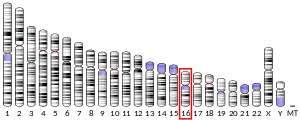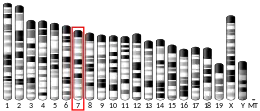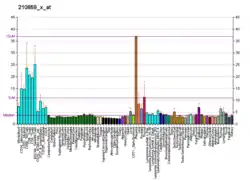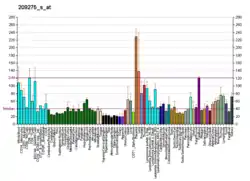Battenin
Battenin is a protein that in humans is encoded by the CLN3 gene located on chromosome 16.[5][6] Battenin is not clustered into any Pfam clan, but it is included in the TCDB suggesting that it is a transporter.[7] In humans, it belongs to the atypical SLCs[7][8] due to its structural and phylogenetic similarity to other SLC transporters.
Function
Battenin is involved in lysosomal function. Many alternatively spliced transcript variants have been found for this gene.[6]
Battenin is a transmembrane protein predicted to be composed of 11 transmembrane helices,[8] yet no crystal structure is available.
Clinical significance
Mutations in this gene, as well as other neuronal ceroid-lipofuscinosis (CLN) genes, cause neurodegenerative diseases commonly known as Batten disease, also known as Juvenile Neuronal Ceroid Lipofuscinosis (JNCL) or Juvenile Batten disease.
References
- GRCh38: Ensembl release 89: ENSG00000188603 - Ensembl, May 2017
- GRCm38: Ensembl release 89: ENSMUSG00000030720 - Ensembl, May 2017
- "Human PubMed Reference:". National Center for Biotechnology Information, U.S. National Library of Medicine.
- "Mouse PubMed Reference:". National Center for Biotechnology Information, U.S. National Library of Medicine.
- Rusyn E, Mousallem T, Persaud-Sawin DA, Miller S, Boustany RM (June 2008). "CLN3p impacts galactosylceramide transport, raft morphology, and lipid content". Pediatric Research. 63 (6): 625–31. doi:10.1203/PDR.0b013e31816fdc17. PMID 18317235.
- "Entrez Gene: CLN3 ceroid-lipofuscinosis, neuronal 3, juvenile (Batten, Spielmeyer-Vogt disease)".
- Perland E, Fredriksson R (March 2017). "Classification Systems of Secondary Active Transporters". Trends in Pharmacological Sciences. 38 (3): 305–315. doi:10.1016/j.tips.2016.11.008. PMID 27939446.
- Perland E, Bagchi S, Klaesson A, Fredriksson R (September 2017). "Characteristics of 29 novel atypical solute carriers of major facilitator superfamily type: evolutionary conservation, predicted structure and neuronal co-expression". Open Biology. 7 (9): 170142. doi:10.1098/rsob.170142. PMC 5627054. PMID 28878041.
Further reading
- Dawson G, Cho S (April 2000). "Batten's disease: clues to neuronal protein catabolism in lysosomes". Journal of Neuroscience Research. 60 (2): 133–40. doi:10.1002/(SICI)1097-4547(20000415)60:2<133::AID-JNR1>3.0.CO;2-3. PMID 10740217. S2CID 28786470.
- Vesa J, Peltonen L (August 2002). "Mutated genes in juvenile and variant late infantile neuronal ceroid lipofuscinoses encode lysosomal proteins". Current Molecular Medicine. 2 (5): 439–44. doi:10.2174/1566524023362311. PMID 12125809.
- Phillips SN, Benedict JW, Weimer JM, Pearce DA (March 2005). "CLN3, the protein associated with batten disease: structure, function and localization". Journal of Neuroscience Research. 79 (5): 573–83. doi:10.1002/jnr.20367. PMID 15657902. S2CID 7952760.
- Lerner Terry J (September 1995). "Isolation of a novel gene underlying Batten disease, CLN3. The International Batten Disease Consortium". Cell. 82 (6): 949–57. doi:10.1016/0092-8674(95)90274-0. PMID 7553855. S2CID 17286972.
- Taschner PE, de Vos N, Thompson AD, Callen DF, Doggett N, Mole SE, Dooley TP, Barth PG, Breuning MH (March 1995). "Chromosome 16 microdeletion in a patient with juvenile neuronal ceroid lipofuscinosis (Batten disease)". American Journal of Human Genetics. 56 (3): 663–8. PMC 1801154. PMID 7887420.
- Janes RW, Munroe PB, Mitchison HM, Gardiner RM, Mole SE, Wallace BA (December 1996). "A model for Batten disease protein CLN3: functional implications from homology and mutations". FEBS Letters. 399 (1–2): 75–7. doi:10.1016/S0014-5793(96)01290-2. PMID 8980123. S2CID 4952651.
- Järvelä I, Mitchison HM, Munroe PB, O'Rawe AM, Mole SE, Syvänen AC (December 1996). "Rapid diagnostic test for the major mutation underlying Batten disease". Journal of Medical Genetics. 33 (12): 1041–2. doi:10.1136/jmg.33.12.1041. PMC 1050819. PMID 9004140.
- Mitchison HM, Munroe PB, O'Rawe AM, Taschner PE, de Vos N, Kremmidiotis G, Lensink I, Munk AC, D'Arigo KL, Anderson JW, Lerner TJ, Moyzis RK, Callen DF, Breuning MH, Doggett NA, Gardiner RM, Mole SE (March 1997). "Genomic structure and complete nucleotide sequence of the Batten disease gene, CLN3". Genomics. 40 (2): 346–50. doi:10.1006/geno.1996.4576. PMID 9119403.
- Munroe PB, Mitchison HM, O'Rawe AM, Anderson JW, Boustany RM, Lerner TJ, Taschner PE, de Vos N, Breuning MH, Gardiner RM, Mole SE (August 1997). "Spectrum of mutations in the Batten disease gene, CLN3". American Journal of Human Genetics. 61 (2): 310–6. doi:10.1086/514846. PMC 1715900. PMID 9311735.
- Järvelä I, Sainio M, Rantamäki T, Olkkonen VM, Carpén O, Peltonen L, Jalanko A (January 1998). "Biosynthesis and intracellular targeting of the CLN3 protein defective in Batten disease". Human Molecular Genetics. 7 (1): 85–90. doi:10.1093/hmg/7.1.85. PMID 9384607.
- Wisniewski KE, Zhong N, Kaczmarski W, Kaczmarski A, Kida E, Brown WT, Schwarz KO, Lazzarini AM, Rubin AJ, Stenroos ES, Johnson WG, Wisniewski TM (January 1998). "Compound heterozygous genotype is associated with protracted juvenile neuronal ceroid lipofuscinosis". Annals of Neurology. 43 (1): 106–10. doi:10.1002/ana.410430118. PMID 9450775. S2CID 41471357.
- Zhong N, Wisniewski KE, Kaczmarski AL, Ju W, Xu WM, Xu WW, Mclendon L, Liu B, Kaczmarski W, Sklower Brooks SS, Brown WT (January 1998). "Molecular screening of Batten disease: identification of a missense mutation (E295K) in the CLN3 gene". Human Genetics. 102 (1): 57–62. doi:10.1007/s004390050654. PMID 9490299. S2CID 27343676.
- Kremmidiotis G, Lensink IL, Bilton RL, Woollatt E, Chataway TK, Sutherland GR, Callen DF (March 1999). "The Batten disease gene product (CLN3p) is a Golgi integral membrane protein". Human Molecular Genetics. 8 (3): 523–31. doi:10.1093/hmg/8.3.523. PMID 9949212.
- Haskell RE, Derksen TA, Davidson BL (April 1999). "Intracellular trafficking of the JNCL protein CLN3". Molecular Genetics and Metabolism. 66 (4): 253–60. doi:10.1006/mgme.1999.2802. PMID 10191111.
- Kaczmarski W, Wisniewski KE, Golabek A, Kaczmarski A, Kida E, Michalewski M (April 1999). "Studies of membrane association of CLN3 protein". Molecular Genetics and Metabolism. 66 (4): 261–4. doi:10.1006/mgme.1999.2833. PMID 10191112.
- Golabek AA, Kaczmarski W, Kida E, Kaczmarski A, Michalewski MP, Wisniewski KE (April 1999). "Expression studies of CLN3 protein (battenin) in fusion with the green fluorescent protein in mammalian cells in vitro". Molecular Genetics and Metabolism. 66 (4): 277–82. doi:10.1006/mgme.1999.2836. PMID 10191115.
- Margraf LR, Boriack RL, Routheut AA, Cuppen I, Alhilali L, Bennett CJ, Bennett MJ (April 1999). "Tissue expression and subcellular localization of CLN3, the Batten disease protein". Molecular Genetics and Metabolism. 66 (4): 283–9. doi:10.1006/mgme.1999.2830. PMID 10191116.
- Järvelä I, Lehtovirta M, Tikkanen R, Kyttälä A, Jalanko A (June 1999). "Defective intracellular transport of CLN3 is the molecular basis of Batten disease (JNCL)". Human Molecular Genetics. 8 (6): 1091–8. doi:10.1093/hmg/8.6.1091. PMID 10332042.
- Loftus BJ, Kim UJ, Sneddon VP, Kalush F, Brandon R, Fuhrmann J, Mason T, Crosby ML, Barnstead M, Cronin L, Deslattes Mays A, Cao Y, Xu RX, Kang HL, Mitchell S, Eichler EE, Harris PC, Venter JC, Adams MD (September 1999). "Genome duplications and other features in 12 Mb of DNA sequence from human chromosome 16p and 16q". Genomics. 60 (3): 295–308. doi:10.1006/geno.1999.5927. PMID 10493829.
- Pane MA, Puranam KL, Boustany RM (October 1999). "Expression of cln3 in human NT2 neuronal precursor cells and neonatal rat brain". Pediatric Research. 46 (4): 367–74. doi:10.1203/00006450-199910000-00003. PMID 10509355.
- Phillips SN, Benedict JW, Weimer JM, Pearce DA (March 2005). "CLN3, the protein associated with batten disease: structure, function and localization". Journal of Neuroscience Research. 79 (5): 573–83. doi:10.1002/jnr.20367. PMID 15657902. S2CID 7952760.
External links
- CLN3+protein,+human at the U.S. National Library of Medicine Medical Subject Headings (MeSH)
- GeneReviews/NCBI/NIH/UW entry on Neuronal Ceroid-Lipofuscinoses
- Human CLN3 genome location and CLN3 gene details page in the UCSC Genome Browser.





